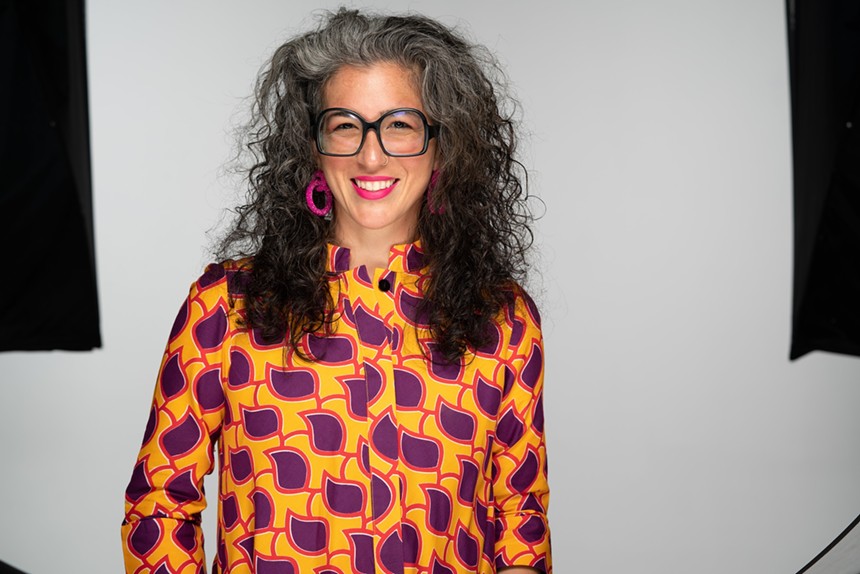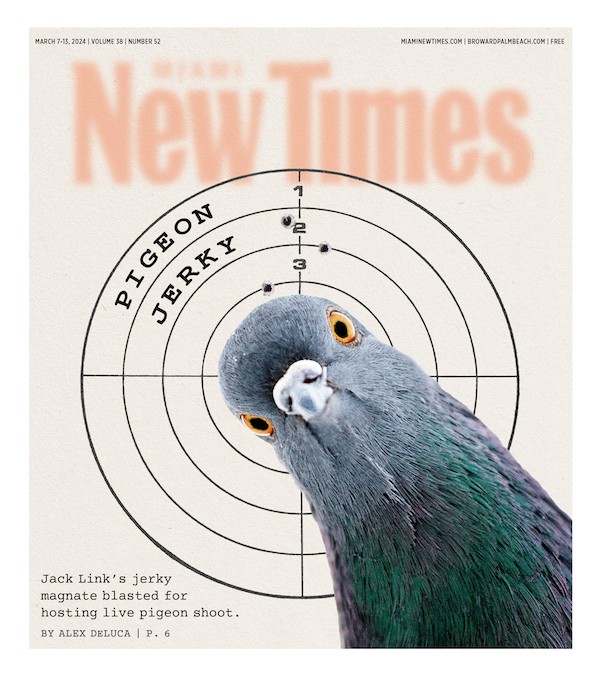Celebrated Cuban-American poet Richard Blanco, whose literary life vaulted to another level in 2013 after President Barack Obama made him the fifth Presidential inaugural poet in the country's history, says, "Home is not just a place. It's a state of mind."
Cuban-American playwright Vanessa Garcia, whose immersive The Amparo Experience made her a higher-profile artist with its months-long Miami run in 2019, likewise has devoted much of her writing to the longing for home and the exploration of roots.
The two Miami writers had never met when Blanco went to an Amparo performance and asked Garcia to chat over martinis at Tap 42 afterward.
Blanco had been living in Maine, where he moved "on a whim."
He says, "I had been searching for a home, a place, belonging — the essential question of my work."
Maine's Portland Stage commissioned Blanco to write a play — the offer came after an onstage conversation with Pulitzer Prize-winning Miami playwright Nilo Cruz — but he wasn't happy with his early draft.
He was intrigued by the site-specific Amparo, Garcia's deeply impactful immersive story of the family behind Havana Club Rum, the Fidel Castro-led Cuban Revolution, and the diaspora that followed. The poet and the playwright talked, met again, and talked some more, and Blanco says that eventually, they decided to collaborate on the piece for Portland Stage.

Richard Blanco, the country’s fifth presidential inaugural poet and Miami-Dade County’s poet laureate, collaborated with playwright Vanessa Garcia on Sweet Goats and Blueberry Señoritas, his first play.
Photo by Matt Stagliano
"I am trying to find plays that speak to the community," says artistic director David Arisco, who chose Sweet Goats to kick off the company's 36th season. "So many theaters do world premieres, but a lot of plays don't get a second production. I thought it would also be exciting for the playwrights to have it seen on their home turf...It was written for Maine, but its roots are in Miami."
Sweet Goats and Blueberry Señoritas pulses with spirit and symbolism, tradition, and the act of finding family in friendships. With the exception of JL Rey, a Tampa actor reprising his world premiere role as Beatriz's Tio Eme, the South Florida-based cast is new, with several making their Actors' Playhouse debuts.
Melissa Ann Hubicsak plays Beatriz (or Bea), who invents the two Cuban-style pastries that give the play its title: "Sweet Goats" are pastelitos with Maine-made goat cheese and guava, while "Blueberry Señoritas" are a flaky pastry filled with Maine blueberries and custard.
Georgie (Elizabeth Price) is her neighbor and closest friend; Maynard (Michael Gioia), a classic salt-of-the-earth Maine character; Blake (Conor Walton), a gay Southerner who brings style and wit to the land of plaid flannel shirts; and Marilyn (Barbara Bonilla), Bea's ailing and lonely mom in Miami.
For Hubicsak — whose heritage is Hungarian, German, and Irish on her father's side, Cuban on her mother's — snagging the leading role of Beatriz in her first Actors' Playhouse show is part of a personal and career renaissance.
The 2008 Florida International University grad developed such a deep fear of auditioning that she stepped back from acting for a while. Then, after losing her relationship, apartment, and day job around the same time, she found solace in seeing a lot of theater and fell in love with the art form again. She met playwright Garcia when she played a principal role in The Amparo Experience, leading her to explore her own Cuban family history.
"This play has a theme of forgiveness, of other people, and oneself," says Hubicsak. "I'm the first-generation daughter of immigrants. I started digging into the history of my own family; there were people who were political prisoners who were tortured, but they didn't talk about it...I had been asking. I was older and wanted to know. Now, I'm recording and documenting everything. Our family has fought and yelled and cried, all because of me."

Melissa Ann Hubicsak as Beatriz and JL Rey as Tio Eme talk about life and family over coffee and pastries in Sweet Goats and Blueberry Señoritas.
Photo by Alberto Romeu
"The play has very Miami things and very Cuban things. It captures the dynamics of how we speak to each other. Richard and Vanessa's writing is very real. One second, you're screaming. Then you laugh," she says.
Born in Cuba, Rey moved to Manhattan's Inwood neighborhood (where In the Heights is set) with his family in 1969, then to Tampa in the early '80s. He worked there for 25 years, then went back to New York; then, post-pandemic, he went back to Tampa. But he has fallen in love with Miami ("I'm thinking of moving to this part of the state," he says) and his second group of Sweet Goats and Blueberry Señoritas castmates.
"I love the character. I get to tell the Cuban side of the story," says Rey. "He's trying to be a bridge between two people he loves. He's attempting to be a peacekeeper, someone who reminds (his sister and niece) that they love each other."
Rey appreciates Arisco's take on the play — "This is being led by a very capable, open-minded, and collaborative director," he says — and the way Garcia and other collaborators are continuing to work on the play's final scene. The ending involves the dance and music of a Cuban guaguancó, a distinct type of rumba, as well as a deeply felt spiritual experience that "becomes more visceral for the audience," he says.
"Obviously, the audience will know about these things — the Pedro Pan program, Freedom Flights, the wonders of Cuban food. It doesn't have to feel as expositional. It can be more emotionally grounded," adds Rey. "In many ways, this is a new play. It's beautifully moving."
Arisco agrees that the scenes between Beatriz and Tio Eme are likely to resonate more powerfully with Miami-Dade County's Cuban population than they might have in Maine. But he hopes audiences at the Miracle's more intimate Balcony Theatre will also have another thematic takeaway.
"It's more about people understanding that you can make a new community, a new family. In Maine, Beatriz is home," says the director.
Born in Madrid to Cuban exile parents and raised in Miami, Blanco earned a bachelor's degree in civil engineering and a master's of fine arts degree in creative writing at Florida International University.
While he notes, "I've been a civil engineer for most of my adult life," he adds, "Once the White House called, it was a game changer."
The inaugural poet tradition began with Robert Frost reading at President John F. Kennedy's 1961 ceremony, and when he was chosen to read his "One Today," Blanco was the first immigrant, the first openly gay man, and the then-youngest inaugural poet. (The sixth inaugural poet, Amanda Gorman, read "The Hill We Climb" at President Joe Biden's 2021 ceremony and is three decades younger than Blanco.)

Vanessa Garcia joined poet Richard Blanco in writing Sweet Goats and Blueberry Señoritas, which premiered in Maine and is getting its second production by Actors' Playhouse at the Miracle Theatre in Coral Gables.
Photo by Chris Headshots
His latest book of poems, Homeland of My Body: New and Selected Poems, contains a mixture of previously published poems and new ones. He'll discuss it with his former teacher and mentor, poet Campbell McGrath, at the Miami Book Fair on Sunday, November 19.
Blanco has several other items on his artistic agenda, including an in-development TV pilot based on his memoir The Prince of Los Cocuyos: A Miami Childhood and a musical based on Waiting for Snow in Havana. (Playwright Karen Zacarias is writing the book, Benjamin Velez the music, and Velez and Blanco are co-lyricists).
In working with Garcia on Sweet Goats and Blueberry Señoritas, he says he learned a great deal about the mechanics of writing a play, the collaborative nature of theater, and trusting the "spareness" of a play's dialogue in comparison to poetry. Would he try playwriting again?
"I've always liked theater, the communal nature of it. To see something you wrote come to life in three dimensions, making people laugh and cry, that's addictive," he says.
As for Garcia, she hadn't thought that the second production of Sweet Goats would happen in her hometown, but as she sits in on rehearsals, makes small changes, and workshops the ending, she sees that it makes sense.
"This play roots from Miami. It is very much from here that the spirit of it comes. Like the bird in the play, it came south," says Garcia.
Garcia has another world premiere in the works, 1,000 Miles. It will be produced by Fort Lauderdale's New City Players and co-produced by the Abre Camino Collective, the arts partnership of Garcia and director Victoria Collado. Elizabeth Price — Georgie in Sweet Goats — will direct the play, running from March 7-24, 2024, at the Island City Stage space in Wilton Manors.
Garcia enjoys collaboration with other writers — Jenna and the Whale, which she wrote with Miamian Jake Cline, had its world premiere in August at the Ground Floor Theatre in Austin, Texas — and she says working with Blanco was great all around.
"Apart from being an amazing writer, he's an amazing person," she says, adding in so many words that he's an admirable role model when it comes to juggling a thriving career and staying true to himself. "God, please keep me that humble."
– Christine Dolen, ArtburstMiami.com
Sweet Goats and Blueberry Señoritas. Friday, November 10, through Sunday, December 3, at Actors' Playhouse at the Miracle Theatre, 280 Miracle Mile, Coral Gables; 305-444-9293; actorsplayhouse.org. Tickets cost $40 to $85. Performances take place Wednesday through Saturday 8 p.m. and Sunday 3 p.m.










